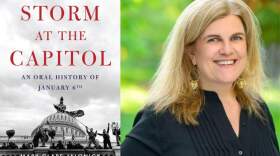BIRMINGHAM, Ala. – The dominoes are beginning to fall in Alabama where a recent state supreme court ruling grants fertilized eggs the same rights as children. The state of Alabama's largest hospital is now pausing a major procedure used in helping women get pregnant.
The University of Alabama at Birmingham hospital, or UAB, has announced doctors there will not be doing any more IVF, or in vitro fertilization treatments.
The recent state supreme court ruling leaves thousands of couples who need help getting pregnant left wondering where they will turn for help building a family. Not only those who use UAB, but for others who wait to see if their local clinic will do the same.
Residents of Alabama and the rest of the country may be shocked by the state's Supreme Court ruling but for many, this was the natural progression for the conservative southern state that in 2022 banned all abortions regardless of cases of incest and rape.
"I was not surprised," said Jill Lens, a professor of law at the University of Arkansas and an expert in reproductive rights. "Alabama Supreme court has for a long time, enthusiastically applied wrongful death law to pregnancy losses and [if] it's a person the second it's in the womb – if it's a person, it's a person. I'm not sure why the location in a freezer would matter."
In other words, anyone who's been following Alabama's abortion debate should have seen it coming in a state where prosecutors have arrested pregnant women for engaging in behaviors like taking drugs that could be harmful to a fetus. Alabama outlaws all abortions, making no exceptions for cases of rape or incest.
While many other states have passed similar legislation, no other state has defined life as beginning at conception, which is essentially what this court ruling does.
No other state has given personhood rights to all fertilized eggs. And even in states that allow the prosecution of women who put the health of their fetuses at risk, most do not apply that prosecution statute to pregnancies before the 24th week. That is the age at which most doctors consider a fetus to be able to live outside the womb.
This case was brought before the state Supreme Court by three couples in Alabama who had frozen embryos being stored at a facility in Mobile. They had used IVF, or in vitro fertilization, to create embryos that were then frozen for them to be able to use at a later date. That's standard procedure in IVF clinics in the United States, where clinics prefer harvesting as many eggs at a time in order to increase the odds of getting even one egg that is healthy enough to be fertilized and put back into a woman's uterus.
What went wrong in this case pertains to the security of the hospital that was storing the frozen embryos. A random patient somehow gained access to the cryogenics lab, grabbed the embryos and dropped them, thus destroying them.
The three couples sued the hospital and a lower court ruled they were not entitled to damages because the frozen embryos were not people. The Alabama Supreme Court, however, ruled that they are indeed people, going so far as calling them "extrauterine children."
Alabama's Chief Justice, Tom Parker, wrote in the decision that destroying life would "incur the wrath of a holy God." Of nine state Supreme Court Justices, only one disagreed.
This case is not likely to be appealed to the U.S. Supreme Court because this was the state's Supreme Court ruling based on a state law.
Critics have long urged the state legislature to spell out exactly who falls under the state's wrongful death statute. It's clear the state's Supreme Court says life begins at fertilization and that it doesn't matter whether that life is in a woman's uterus or in a freezer in a fertility clinic.
If Alabama lawmakers fail to define at what age a fertilized egg becomes a person, it could become a crime in Alabama to destroy frozen embryos. That could ultimately mean those embryos could be frozen forever, because it's not clear yet if those frozen embryos could be donated to other states or to science, because they have now been given the same protection as children.
The irony, here, is that the very lawsuit filed by the three couples who were upset when their embryos were destroyed may actually end up making it far more difficult for Alabamians who are struggling to conceive naturally.
Copyright 2024 NPR





